‘Outrageous’: DTE, Consumers enjoy close relationship with state panel that regulates them
LANSING — When an association of energy suppliers sued the Michigan Public Service Commission over its implementation of state electricity law, it hired a former chair of the commission to take the case to court.
In defending the suit, the three members of the commission teamed up with one of the biggest companies they regulate, Consumers Energy. They filed a joint trial brief and even shared lawyers.
Michigan residents endure some of the nation's least reliable electricity service along with some of the highest residential rates. A Free Press investigation found the state commission charged with preventing that from happening lacks transparency in its decision-making and gets 80% of its funding from DTE Energy and Consumers — the two companies with a near monopoly on providing electricity to Michigan residents. Commissioners regularly attend conferences at swanky resorts that are wholly or partly funded by utility trade groups and frequently use the knowledge and contacts they glean as commissioners to solicit clients as utility and energy consultants once they leave.
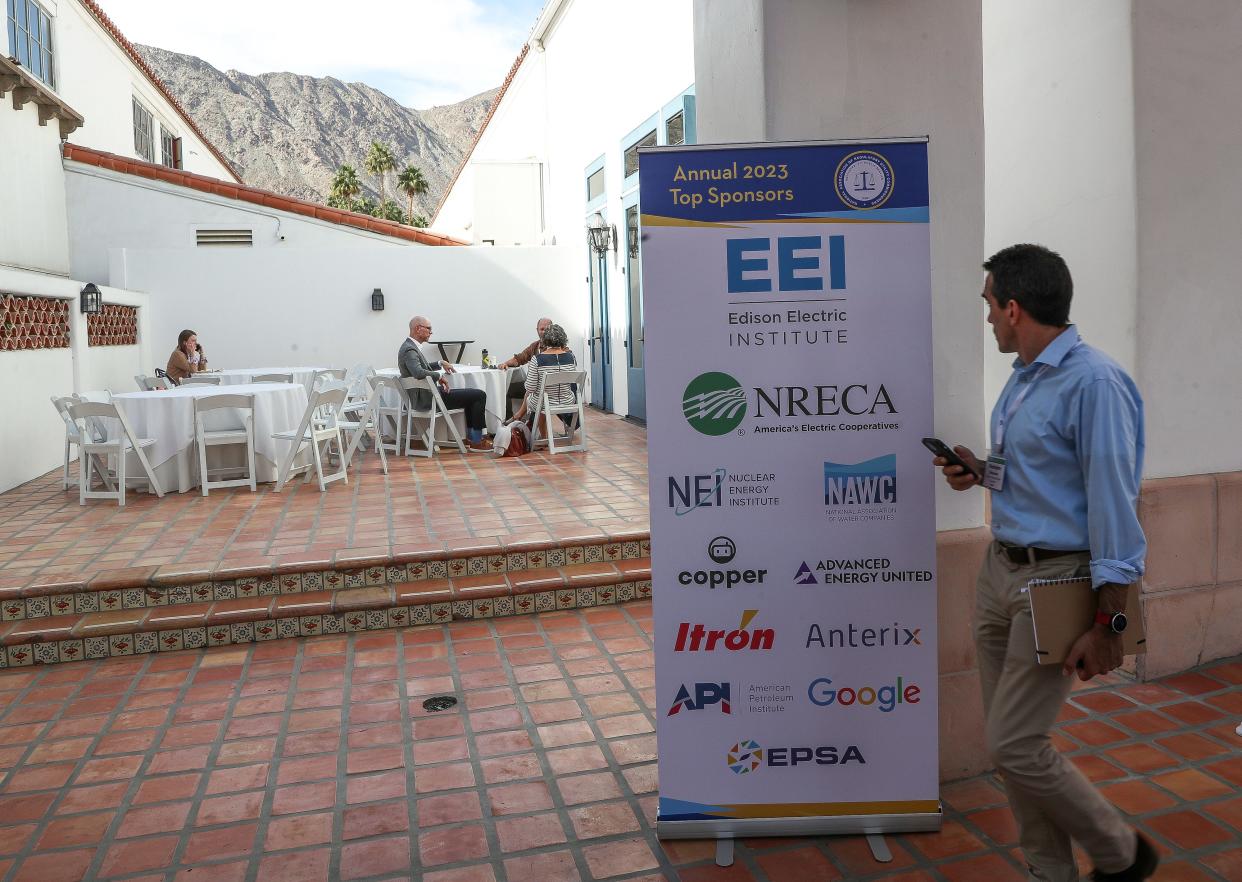
"Outrageous," said Tiah McKinney, who the Free Press interviewed after she attended a community meeting in Detroit to vent about high electric bills and frequent outages.
"We can see how we got here," McKinney said after reviewing some of the newspaper's findings. "Michigan families deserve better."
A monthslong investigation found:
Of 19 commissioners whose service on the Public Service Commission has ended since 1990, at least 15, or 79%, went on to work in jobs related to energy, electricity, and/or how such fields are regulated, including one, John Shea, who joined Consumers as a staff attorney. Ten outgoing commissioners immediately launched consulting and/or legal businesses that catered to energy firms and/or how they are regulated. State law bars outgoing commissioners from working for utilities they regulated for six months.
The commission solicits utility-funded organizations such as the Edison Electric Institute, an association of investor-owned utilities, for thousands of dollars in individual sponsorships to underwrite annual meetings of the Mid-America Regulatory Conference (MARC), a regional association of utility regulators. Profits from the annual meetings are used to cover travel, meal and accommodation costs for "commissioner only" meetings held each winter in Southern locales, where commissioners can stay an extra free night at the hotel after the meeting ends, records show.
Of the commission's $34.9 million budget, all but about $3 million in federal grants is paid by assessments levied against Michigan utilities. DTE and Consumers pay 88% of that assessment, or 80% of the total commission budget. Not all states pay for utility regulation this way. Illinois, which also has a tax on utilities, dictates that commissioners' salaries must be paid separately, from the state's general fund.
The MPSC conducts nearly all of its deliberations in secret, despite the fact an exemption from the Open Meetings Act that commissioners fought for and won in 1988 was sold to lawmakers and the public as a limited exemption to expedite rate cases. Amid that lack of transparency, none of the 4,520 orders the MPSC has voted on since at least 2010 have been voted down, a Free Press analysis showed. The last "no" vote cast by any commissioner was in 2015, despite the fact no more than two commissioners can come from the same political party.
DTE and Consumers, as well as other utilities the commission regulates, generally pay higher salaries than the state and regularly poach their staff and legal representatives, raising concerns about potential influence on active employees. Since 2018, an appellate head in the public service division of the Attorney General's Office, who represented the MPSC and its employees, took a senior job with DTE Energy, and another attorney who represented MPSC staff became a regulatory attorney with Consumers Energy. In 2021, an MPSC communications manager left for a marketing job at Consumers and earlier this year the MPSC's manager of energy markets was named manager of regulatory strategy for ITC Holdings, an electric transmission company with a contentious case now before the commission.
The "revolving door" for utility commissioners applies to not just where they go when they leave the commission, but where they came from. For example, former Republican Gov. Rick Snyder appointed a former Consumers Energy executive, Norm Saari, to the state panel.
Current and former commissioners reject the idea the commission, which has about 200 employees, is too cozy with the big utilities. They say utility regulation in Michigan is a national model and point to factors such as an abundance of trees, changing weather, too little spent on infrastructure during Michigan's deep recession of the 2000s, the Mitten State's geography as two peninsulas, and bills passed by the Legislature when asked why Michigan has high rates and low reliability. They point to the personal integrity of commissioners appointed by governors from both parties and the absence of corruption scandals like the bribery scheme that rocked the Ohio Public Utilities Commission in 2020. But economists say the independence of commissioners from the entities they regulate can be undermined in sometimes subtle ways, in a phenomenon known as "regulatory capture," without anything illegal happening.
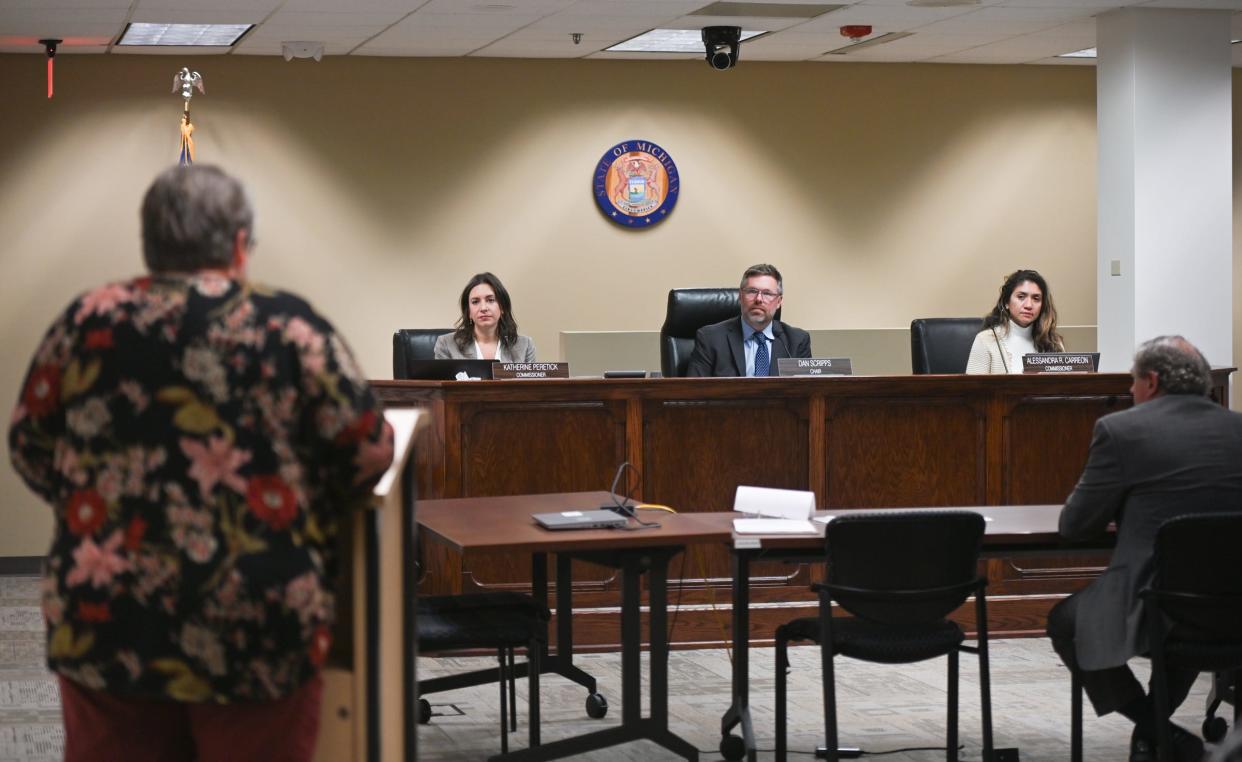
When regulatory capture exists, it doesn't mean the commission gives the dominant utilities everything they request. But it can mean, over time, that the commission grants higher rate increases than it otherwise would and falls short in holding utilities accountable for various failures, with customers suffering as a result. In Michigan, for at least the past decade until very recently, the MPSC granted DTE and Consumers rate increases higher than the national average for investor-owned utilities that get their rates approved by regulators, even though the companies' performance on reliability and affordability has long been subpar, according to data analyzed by the Citizens Utility Board of Michigan. And although the commission opened investigations into inadequate storm responses by DTE and Consumers in 2014, 2017, 2018, and 2021, it was not until 2022, after another storm response failure, that the MPSC ordered a $1.7 million outside audit of their systems, which is still pending.
"Rather than trying the same things over and over again that have not shown measurable results in the past," an independent audit "is necessary to determine measures that may mitigate or avert future crises, including the loss of life and the loss of essential public services," Commissioner Katherine Peretick said in October 2022.
The Free Press investigated the MPSC over several months, interviewing nine current or former commissioners, including five chairs, creating a database of commissioners going back to former Gov. John Engler, and reviewing minutes from more than 300 meetings dating to 2010, among other reporting.
High electric rates, unreliable service
In June of this year, following another series of outages, about 50 Detroit residents gathered at Farwell Recreation Center on the east side to vent to their state representatives about frequent power outages, high electricity bills, and the $25 to $35 discounts DTE offered for extended blackouts that destroy refrigerators and freezers full of food and can sometimes force hotel stays. They questioned why the company was not required to use a greater share of its hefty profits — more than $1 billion in net income in 2022 and close to that in 2021 — to improve the reliability of its grid.
"Where is the accountability?" was one of the questions posed that night by McKinney, who has a doctorate in educational policy and heads a foundation focused on health and education equity.
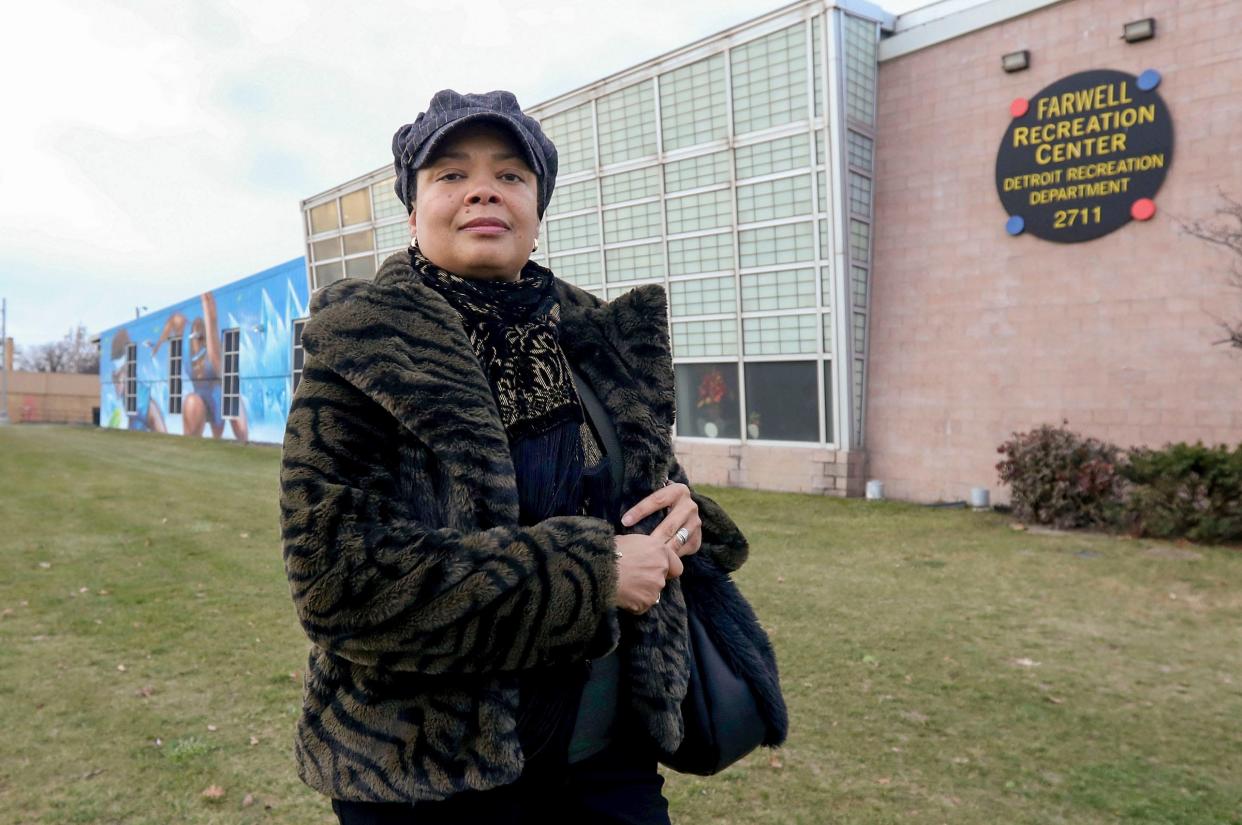
More: DTE, Consumers Energy among worst utilities in US for blackout durations
More: What DTE is doing about reducing power outages
McKinney said after the meeting she is concerned about the life-changing impact that expensive and unreliable electric service has on the health and educational attainment of Detroit residents and does not believe that concern has been reflected in the actions of the commission.
"You've got folks that really come with connections and an agenda," McKinney said after the meeting. "They're coming from these industries," and "they have an orientation."
Among those seated at the front of the room to hear the complaints was Dan Scripps, a former Democratic state representative from northern Michigan's Leelanau County whom Whitmer named to the MPSC in 2019. As chair since 2020, he is paid just over $162,000. The other two commissioners — Peretick, appointed in 2021, and Alessandra Carreon, who attended her first meeting in July — each receive about $139,000.
Scripps told the small crowd there are inequities in Michigan's residential electricity rates and service levels, with some of the outages tracking with "historic disinvestment" and lower levels of service in areas with majority Black populations. Also, residents with smaller homes are in many cases subsidizing residents with larger ones while those without central air conditioning subsidize those who have it, Scripps said.
He strikes a different tone than many past chairs. Under his leadership, the commission has approved $911.6 million of the $2.2 billion in rate increases DTE and Consumers have requested for their electric and natural gas customers. That 42% approval rate is low by historic standards, observers such as the Citizens Utility Board of Michigan say, though Attorney General Dana Nessel has been particularly active as an intervenor on behalf of residential consumers during that time. The commission under Scripps has also ordered the third-party audit while pushing the utilities to marginally increase the billing credits they offer residential customers for extended power outages and mulling a shift to a system where the companies' rates would be based, in part, on how well they perform.
The makeup of the current commission is unusual in that, along with Scripps, an attorney, it has two engineers. Peretick, appointed as an Independent member, is a mechanical engineer who has worked on energy storage and wind turbines, among other areas. Carreon, a Democrat and the state’s first Asian American commissioner, is a chemical engineer who has worked on electric vehicle and climate issues for RMI and Ford Motor Co.
MPSC chair arrived with conflicts
Scripps, who worked for various energy-related associations and foundations after losing his bid for a second term in the state House in 2010, including a stint as president of the Michigan Energy Innovation Business Council when it had business before the commission, has his own conflicts to manage.
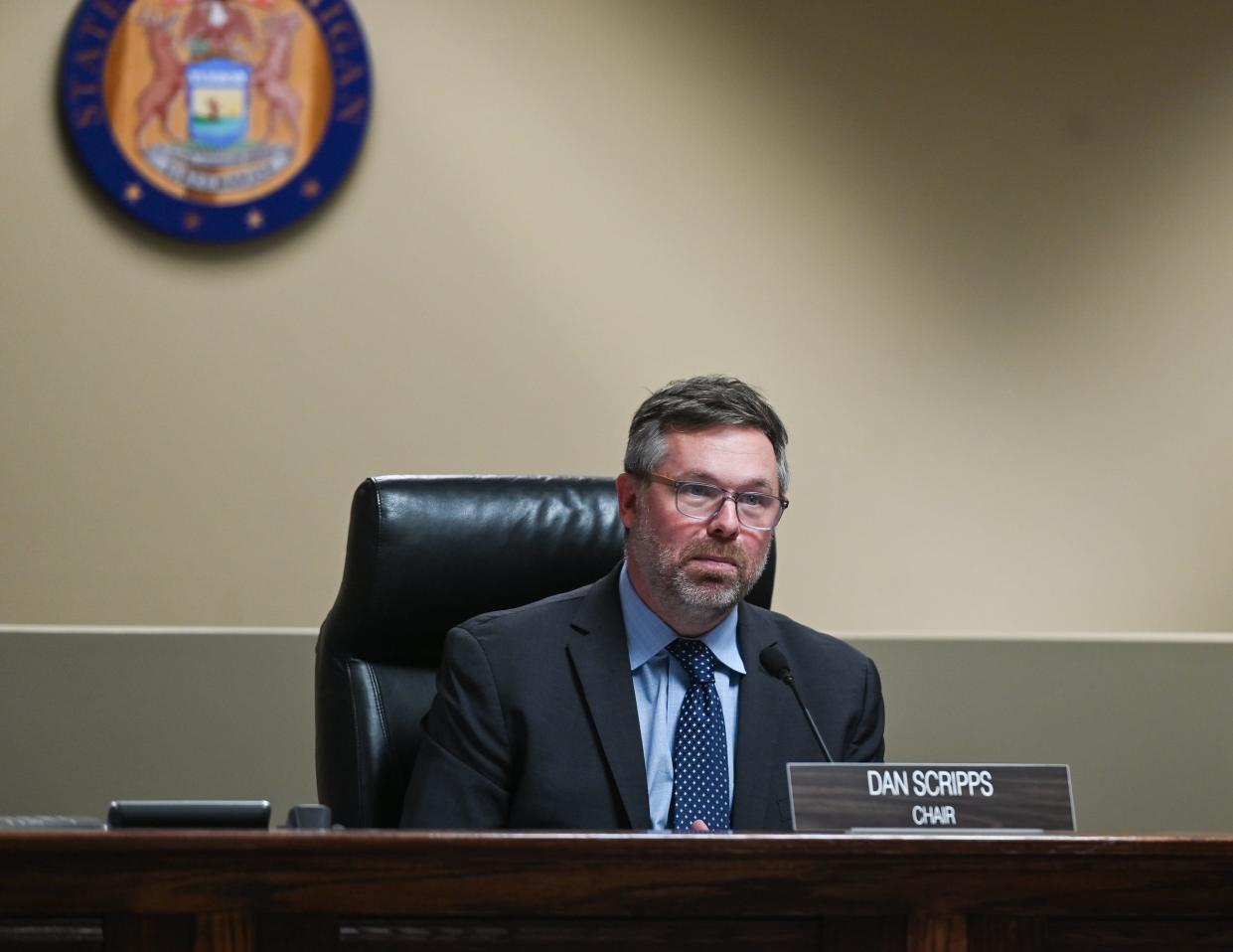
At the time of his appointment, Scripps' wife, Jamie Weitzel Scripps, was a partner in Five Lakes Energy, a Lansing-based firm that provides management, research and public policy services related to clean energy. Jamie Scripps, an attorney and former state environmental official, had even testified in a DTE rate case that was pending before the commission. She sold her interest in Five Lakes Energy and Scripps recused himself from the rate case.
At the same time, Jamie Scripps in 2019 started her own energy consulting firm, Hunterston Consulting, LLC of Northport, which in 2021 was awarded a $96,000 contract with the Michigan Department of Environment, Great Lakes and Energy. That contract, to support Whitmer's Council on Climate Solutions, has since been extended and increased to $245,000, state records show.
Hunterston Consulting "offers climate research and advanced energy policy expertise to clients across the Midwest," along with "electricity rate design research," according to the company website.
The website doesn't list the firm's clients. Dan Scripps said he only knows the identities of a few of his wife's clients but knows that her company, with the exception of her contract with the state, does not do business in Michigan.
Jamie Scripps did not respond to a phone call and email from the Free Press.
Because of the conflicts related to his wife and his past business ties, Scripps in 2019 entered into an "ethics compliance and conflicts of interest avoidance plan" with Whitmer's office, records show.
Among the commitments Scripps made was that he would not solicit money, goods, or anything of value "for the benefit of a person or organization, other than the state, which tends to influence the manner in which I or another public officer or employee performs official duties."
In late 2022, Scripps, along with an MPSC staff member, signed a letter sent to energy-related businesses and utility associations such as the American Gas Association — which counts DTE President Jerry Norcia among its officers — asking them to sponsor the August 2023 annual meeting of MARC, held in Grand Rapids, at levels ranging from $1,000 to $15,000 each, and up. MARC is not a state agency but an association of 14 state public utility commissions.
"We hope you will consider becoming a sponsor," read the letter Scripps signed as a "Michigan commissioner" and "MARC officer."
Utility groups support Southern getaways
Though the association does not directly seek money, beyond conference registration fees, from the utilities it regulates, it does seek sponsorships from utility groups, plus companies in the energy and telecommunications field and auto manufacturers increasingly interested in electricity issues, records show. MARC annual meetings, which are hosted on a rotation by member states, routinely raise $100,000 or more in corporate sponsorships and post significant profits from sponsorships and registration fees. An annual meeting held in Chicago in 2017 netted $154,000, according to association minutes.
Those profits are used to support January "commissioner only" meetings, typically held in Texas, the southernmost MARC state, in San Antonio or Austin, and never in North Dakota, the coldest member state, minutes show. MARC pays for travel, meals and accommodation.
Scripps said he doesn't think the letter he signed violates his conflict avoidance plan because he doesn't think the industry sponsorships tend to influence him or anyone else at the MPSC. Asked whether he was comfortable asking utility groups for tens of thousands of dollars in sponsorships to help pay for winter trips to the South for himself and other Michigan commissioners, Scripps said that MARC, where he has served as president, follows the same guidelines as the National Association of Regulatory Utility Commissioners (NARUC), where he is a board member.
"I don't solicit personally," Scripps said.
Shown the letter he signed that was distributed to potential sponsors, Scripps said: "I'm not sort of doing the calls to do that."
Scripps, Peretick, and Carreon, along with two MPSC staff members and a representative of the Michigan Attorney General's Office, recently attended the annual meeting of NARUC, from Nov. 12 to 15 at the La Quinta Resort & Club, described by one travel guide as "a go-to desert hideaway for Hollywood A-listers," 25 miles southeast of Palm Springs, California.
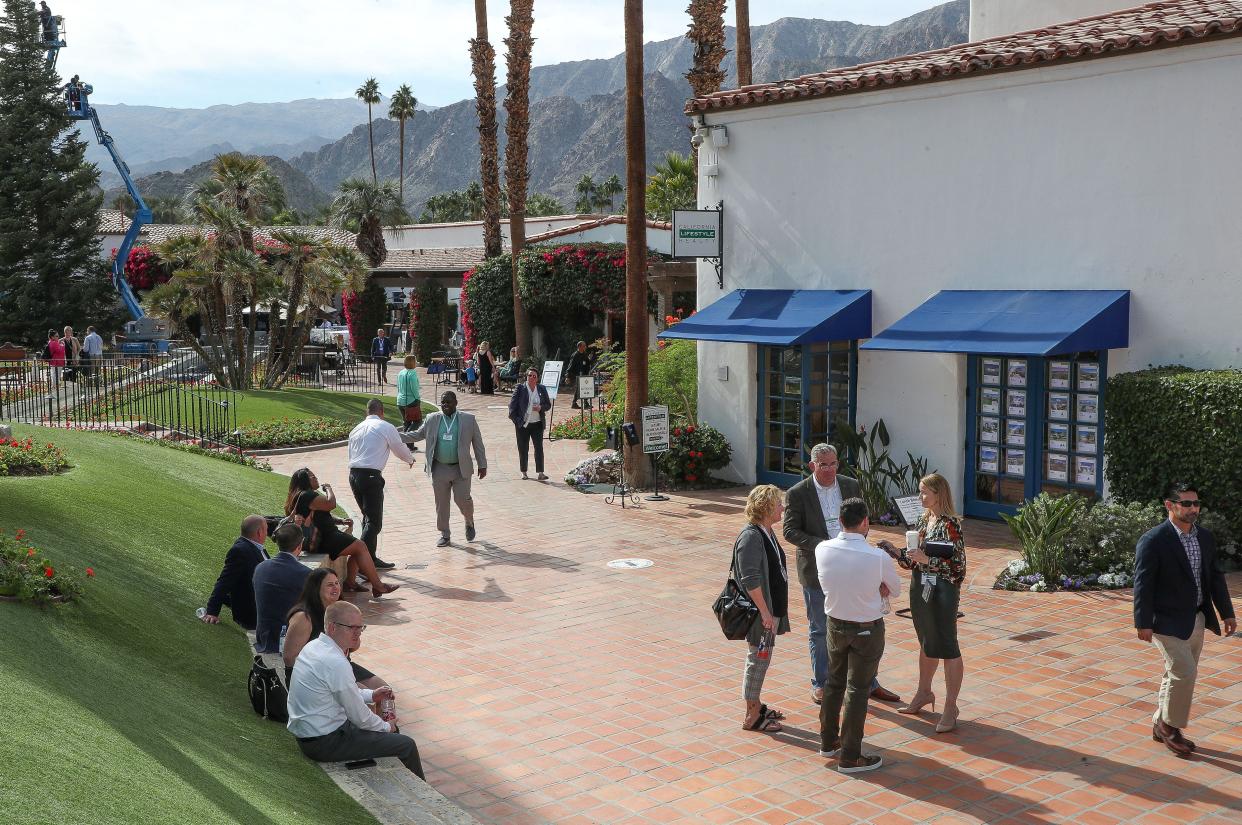
Scripps said that because he and Peretick represent Michigan on two different regional utility organizations that scheduled their board meetings to coincide with the La Quinta event, they each had their airfare and two hotel nights paid by those regional groups. Any additional hotel costs, plus the travel costs for Carreon and the MPSC staff members will be covered by the commission's $236,000 travel budget, he said.
NARUC's executive director is former MPSC Commissioner Greg White, who was paid $332,000 last year, according to IRS nonprofit records. Under White, NARUC also seeks meeting sponsorships from the Edison Electric Institute, the American Gas Association, and other industry players, including groups such as the AARP who sometimes intervene in rate hearings, typically raising about $250,000 per meeting that way, said Regina Davis, the group's assistant executive director. Some of that revenue is used to cover lodging at the annual meeting for NARUC's executive committee and committee chairs, she said.
Though the La Quinta venue was surrounded by a golf course, tennis courts, and swimming pools, the NARUC annual meeting agenda was loaded with serious topics such as "operational challenges in our bulk power system," and "gas-electric coordination."
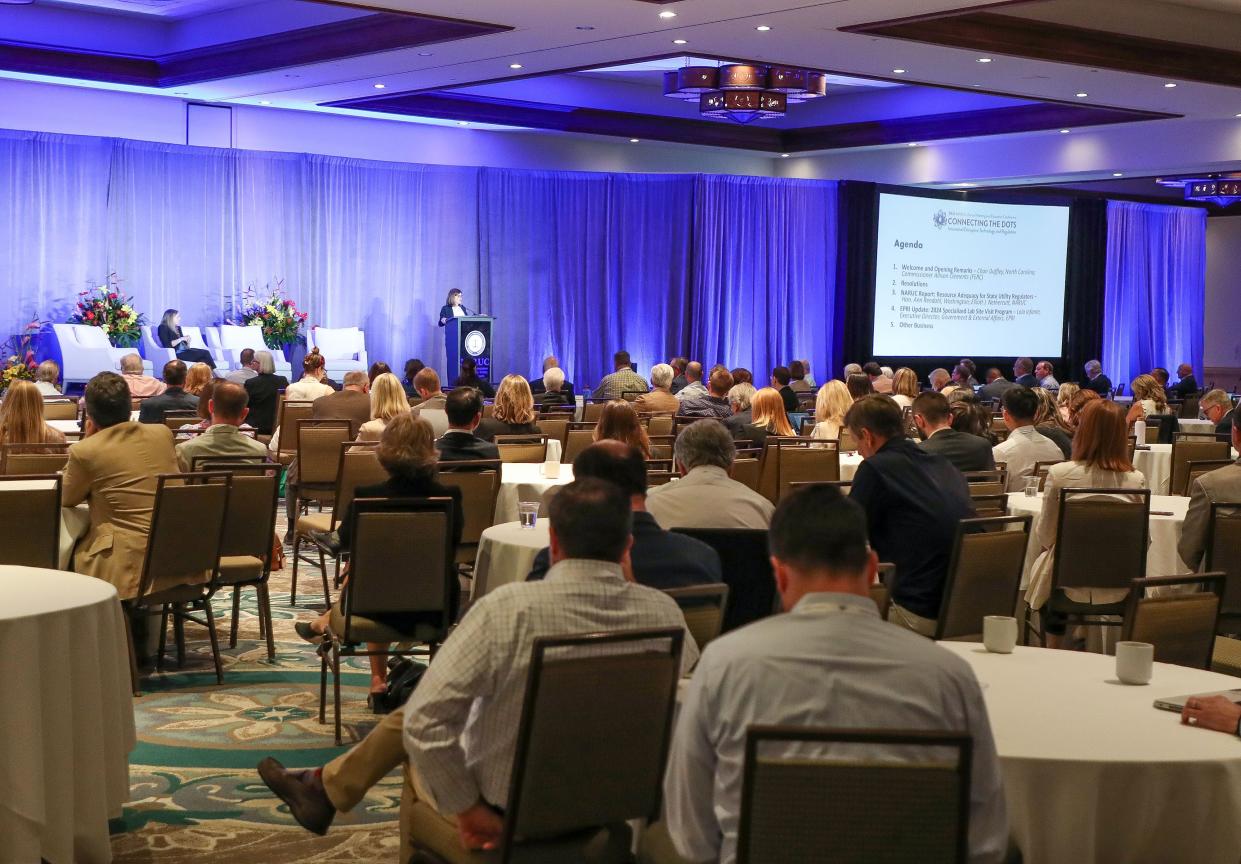
Current and former MSPC commissioners were unanimous in describing such meetings as invaluable ways to exchange information with their counterparts from around the country and keep abreast of the latest industry trends.
But commissioners mix business and pleasure even at the MARC annual meetings, minutes show. "Golf Sunday, and fly fishing trip" were part of the plans for the MARC annual meeting in Little Rock, Arkansas, in 2013.
Scripps said commissioners pay from their own pockets for golf or any other events away from the meetings. When commissioners bring family members, they pay themselves for family travel and meals, though spouses may share rooms paid for with corporate or public funds, he said.
Ratepayers shut out
Ratepayers are shut out from discussions that take place at out-of-state conferences, and Scripps acknowledged that even in Lansing, the MPSC conducts nearly all its deliberations behind closed doors, with only the formal votes and any statements commissioners want to make about those orders taking place in open meetings.
More: DTE and Consumers say they need to raise rates as outages mount
More: Consumers Energy unveils plan to cut power outage durations, frequency
"This exemption (to the Michigan Open Meetings Act) has long been applied to all proceedings before the commission and is not limited to just rate cases," Scripps said.
"I strongly believe that this process promotes the public interest in the form of more reasoned results."
That's not how the debate over the MPSC's contentious Open Meetings Act exemption was framed in 1988. The state House initially voted down the measure, amid opposition from consumer groups and newspaper editorials, but later reversed itself. The late state Rep. Alma Stallworth, D-Detroit, a longtime chair of the House Public Utilities Committee, said it would speed up a lengthy and cumbersome rate-setting process, in which the commission has a quasi-judicial role, the Free Press reported at the time.
Scripps confirmed the commission meets privately to consider all its orders, of which rate cases make up only a small percentage.
Laura Chappelle, a former MPSC chair who was appointed by Republican Gov. John Engler, said she's impressed by the willingness of Scripps and the current commission to significantly reduce the utilities' requested rate increases.
"A lot of political pressure comes to bear on the chairman from the large, regulated entities," said Chappelle, who was on the commission from 2001 to 2007 and chaired the body for more than two years. She wouldn't specify what forms that pressure takes, beyond utility donations to campaign and nonprofit funds controlled by elected officials, which are substantial.
"No comment," Chappelle said, when pressed on that question.
"It's tough to regulate them — to tell them, 'No,' every once in a while."
Scripps said he hasn't felt the kind of pressure from big utilities that Chappelle referenced.
'My understanding is that that may have been how things worked in the past and may be the way things work in other states," Scripps said. But in Michigan, "a culture was created where that was not acceptable."
He said he takes phone calls from the presidents of DTE and Consumers, but only to discuss operational issues, not rate cases.
DTE and Consumers don’t embrace the idea that the MPSC is “captured” by them and favors their interests over ratepayers.
Trevor Lauer, vice chairman of DTE Energy, said Michigan's residential rates are high because they have the cost of state-mandated efficiency and conservation programs baked into them, resulting in lower bills for homeowners and no windfall for the company.
Katie Carey, a spokeswoman for Consumers, said the MPSC “regulates utilities according to well-established laws and procedures.” The company’s “relationship with the commission and interested stakeholders has and will continue to be professional,” and laws and rules ensure a “fair, transparent, and impartial” process, she said.
Without elaborating, Scripps said he partly credits former MPSC Commissioner Sally Talberg, who immediately preceded him as chair, for making sure the commission was insulated from external pressures.
Talberg was appointed by Snyder in 2013 as an Independent commissioner and became chair in 2016. Before that, she was a senior consultant, focusing on energy issues, at Public Sector Consultants of Lansing, which counts DTE and Consumers among its clients. She returned to PSC in a similar role in 2021 after forming her own consulting firm, Talberg Policy Solutions, that January.
But Talberg's record shows she could also be tough on the companies. Notably, after pro-competition state lawmakers complained they were targeted by Consumers Energy-backed nonprofits in the 2018 election, the MPSC issued a 2019 order temporarily barring Consumers from using corporate dollars to fund nonprofit political advocacy groups.
Talberg confirmed that before joining the commission, she performed work at PSC that was funded by both DTE and Consumers but didn't feel she had any conflicts that would require recusals. PSC has a diverse group of clients, sometimes on both sides of an issue, and those paying for a study don't call the shots on the conclusions, she said.
MPSC and Consumers team up to fight suit
Chappelle, an attorney, believes the energy laws the Legislature passes are much more influential than the makeup and actions of the commission. State laws passed since 2008, which have essentially snuffed the competitive electric market created by legislation passed in 2000, are "placating the utilities at the cost of customers," she said. "The commission can only do so much, right? They're just implementing the law and their hands are tied."
Chappelle, who formed Chappelle Consulting, LLC immediately after leaving the commission and later became a partner in the Potomac Law Group, specializing in regulatory and energy law, is part of a team of attorneys representing Energy Michigan, Inc., an association of alternative energy suppliers, in its 2020 lawsuit against the MPSC. Among the lawyers she has been up against in that case is Consumers staff attorney Spencer Sattler, who first appeared on the docket as a lawyer for MPSC staff, before leaving the Attorney General's Office in 2022 and joining the utility.
That suit, in which the MPSC and Consumers Energy teamed up to file a joint trial brief, alleges the MPSC's interpretation under Talberg of a 2016 state law — not the law itself — is unconstitutional by essentially forcing each alternative supplier to purchase power from DTE and Consumers when they could make cheaper purchases outside the state. The commission said the "buy Michigan" rule is needed to ensure reliability of supply.
Chappelle acknowledged that commission actions, not the law, are the central question in the suit. But said she thinks that case is "an outlier."
Energy Michigan lost in federal court in Detroit in February and has appealed to the U.S. 6th Circuit Court of Appeals.
The MPSC hopes the lower court decision stands. As does Consumers Energy.
Contact Paul Egan: 517-372-8660 or pegan@freepress.com. Follow him on X, formerly known as Twitter, @paulegan4.
This article originally appeared on Detroit Free Press: DTE, Consumers enjoy close relationship with panel that regulates them
